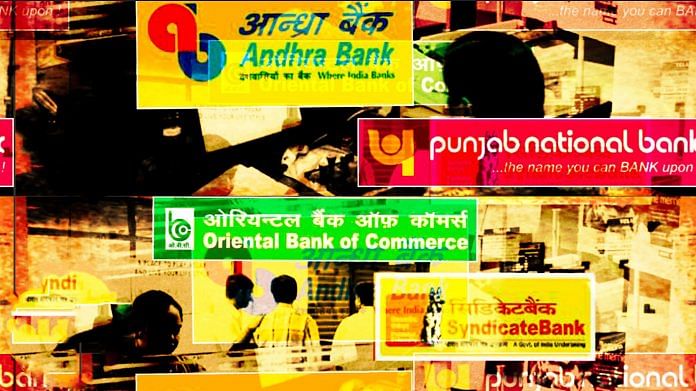
Mumbai: Privatisation of public sector banks (PSBs) is finally here. On Monday, Finance Minister Nirmala Sitharaman announced that the Narendra Modi government will divest its stake in two PSBs, apart from one general insurance company. Moreover, the disinvestment process of IDBI Bank will also be completed in the next fiscal.
While the FM did not name in her Budget 2021 speech the two banks the government plans to privatise, analysts point out Bank of Baroda (BoB) and Punjab National Bank (PNB) are possible candidates.
Both state-run lenders have seen their balance sheet swell as smaller PSBs were merged with the two. While Bank of Baroda absorbed Vijaya Bank and Dena Bank, United Bank of India and Oriental Bank of Commerce were merged with Punjab National Bank.
After the announcement, BoB shares shot up 8.6 per cent on the Bombay Stock Exchange while PNB shares closed almost 7 per cent higher. Stocks of most commercial banks ended in green Monday following a series of budget announcements to foster banking sector reforms.
“After the government’s last announced merger of 13 public sector banks into five, the government has taken the first step towards privatising state-run banks starting with divestment of two PSU banks, in a bid to expedite long-awaited reforms in the banking sector. We believe merged PSU banks like BoB, PNB or non-merged banks like Bank of India, Bank of Maharashtra, may be on the radar,” said Kajal Gandhi, BFSI analyst at stock broker ICICIdirect.
Bank of India, UCO Bank, Bank of Maharashtra, Central Bank of India, Indian Overseas Bank and Punjab & Sind Bank are some of the PSBs that were not a part of the merger.
Why BoB and PNB could be better fit
According to analysts, BoB and PNB are better structures when it comes to divestment among public sector banks. Both the banks are trading at around 0.45 times the price to the book value.
“They [BoB & PNB] are better choices to attract investor’s interest. Under the consolidation exercise — BoB and PNB are better structured entities now. Relatively better quality companies were merged into them,” said Deven Choksey, managing director of KR Choksey Investment Managers.
He said the proposal to privatise two PSBs and one insurance firm is the beginning of the privatisation process and it could bring in many more banks eventually. “For investment perspective, such PSBs could attract new investors, which in turn should result in rerating them,” he said.
In a statement, PNB managing director and chief executive S.S. Mallikarjuna Rao described the strategic disinvestment plan a “step in the right direction”.
“Stake sale by the government in public sector companies and financial institutions, including 2 PSBs and one insurance company, in the next fiscal year is a welcome move,” Padmaja Chunduru, MD & CEO of state-run lender Indian Bank, said in a statement.
Unions oppose move
In its trend and progress report in December 2020, the Reserve Bank of India had noted that the merged entities can now reap benefits of synergy, especially in the case of branch network presence across regions.
For example, United Bank of India, which had a large presence in the eastern region, will now benefit from the more diversified branch network of PNB that had a vast network in the northern and central region before the merger.
FM Sitharaman said the necessary legislative amendments for PSB privatisation will be introduced in the current budget session of the Parliament.
However, the bank unions are not happy with the proposed exercise and said they will oppose it.
In a statement, All India Bank Employees’ Association (AIBEA) general secretary C.H. Venkatachalam said, “As regard the government’s proposal to privatise the banks along with more FDI in the insurance sector, the AIBEA will shortly decide agitational programmes including strike actions.”
Subscribe to our channels on YouTube & Telegram
Why news media is in crisis & How you can fix it
India needs free, fair, non-hyphenated and questioning journalism even more as it faces multiple crises.
But the news media is in a crisis of its own. There have been brutal layoffs and pay-cuts. The best of journalism is shrinking, yielding to crude prime-time spectacle.
ThePrint has the finest young reporters, columnists and editors working for it. Sustaining journalism of this quality needs smart and thinking people like you to pay for it. Whether you live in India or overseas, you can do it here.